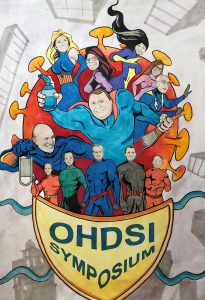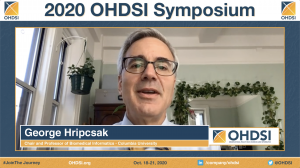The 2020 OHDSI Global Symposium brought together a global research community for 18 hours of open science, international collaboration and community fun on Oct. 19. The day included presentations from community members, panels that brought together leaders from a variety of major healthcare organizations, as well as network sessions, the annual collaborator showcase, and plenty more. Please check out this page for complete updates from the day, and follow the OHDSI Twitter and LinkedIn feeds for the #OHDSISocialShowcase, which will highlight all presentations from the 2020 Collaborator Showcase.
The four-day event also included five virtual tutorials on Oct. 18, and a two-day study-a-thon (Oct. 20-21) that focused on two cardiovascular clinical prediction models (CPM) routinely used in clinical practice: the Revised Cardiac Risk Index (RCRI) and the Pooled Cohort Equations. That collaborative effort set the foundation for multiple network studies on these important healthcare issues.
Global Symposium Sessions
State of the Community
Video: Full Presentation
Slides: State Of The Community • Literature Review
George Hripcsak, director of the Columbia University OHDSI Coordinating Center, provided an update on the state of the OHDSI community, as well as a review of OHDSI publications over the last 12 months. Several working group leads and representatives of OHDSI collaborations also provide updates.
Plenary Session: Large Scale Network Phenotype Development, Evaluation and Characterization
 Presenters: Patrick Ryan, Anna Ostropolets, Gowtham Rao, Anthony Sena, Talita Duarte-Salles, Noémie Elhadad
Presenters: Patrick Ryan, Anna Ostropolets, Gowtham Rao, Anthony Sena, Talita Duarte-Salles, Noémie Elhadad
Video: Full Presentation
Slides: Patrick Ryan • Anna Ostropolets • Gowtham Rao • Anthony Sena • Talita Duarte-Salles • Dani Prieto-Alhambra • Noémie Elhadad
Members of the OHDSI community present the plenary session on Large Scale Network Phenotype Development, Evaluation and Characterization. Specific topics can be seen on the image to the right.
Timestamps:
0:00 – Patrick Ryan (A Framework for Phenotype Development and Evaluation)
10:59 – Anna Ostropolets (Concept Prevalence — an OHDSI Network Study; Design Diagnostics — PHOEBE)
32:07 – Gowtham Rao (Data Diagnostics; OHDSI Phenotype Library)
55:16 – Anthony Sena (A Framework for Large-Scale Characterization)
1:07:43 – Talita Duarte-Salles (CHARYBDIS – Large-Scale Characterization of COVID-19 Disease Natural History)
1:20:15 – Dani Prieto-Alhambra (SCYLLA – Large-Scale Characterization of COVID-19 Treatment Utilization)
1:30:30 – Noémie Elhadad (HERA – Large-Scale Characterization of Health Equity)
1:44:02 – Patrick Ryan (Concluding Remarks)
Panel: Building Trust: Evidence and its Communication
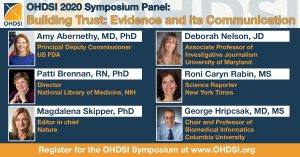 Panelists: Amy Abernethy (Principal Deputy Commissioner of the U.S. FDA), Patti Brennan (Director of the National Library of Medicine, NIH), Magdalena Skipper (Editor in Chief, Nature), Deborah Nelson (Associate Professor of Investigative Journalism, Univ. of Maryland), Roni Caryn Rabin (science reporter for the New York Times)
Panelists: Amy Abernethy (Principal Deputy Commissioner of the U.S. FDA), Patti Brennan (Director of the National Library of Medicine, NIH), Magdalena Skipper (Editor in Chief, Nature), Deborah Nelson (Associate Professor of Investigative Journalism, Univ. of Maryland), Roni Caryn Rabin (science reporter for the New York Times)
Moderator: George Hripcsak
Video: Full Presentation
COVID-19 was a new infection inflicting enormous suffering with no known treatment and little known about its transmission. The scientific community roared into action, quickly generating evidence from observational data and beginning numerous trials. The editorial and peer-review process was overwhelmed, and the urgent need for evidence required rapid assessment of the studies’ rigor and importance. Highly publicized retractions and corrections contributed to a general feeling that a large proportion of the published work was substandard and misleading.
The OHDSI community strives to avoid substandard work by providing a public protocol before beginning research, reporting results only from multi-institution studies, verifying results with a full set of diagnostics, executing data quality checks, reporting data provenance, etc. Such rigor takes time, however, and given the current paradigm of celebrating being “first,” there remains little opportunity to provide reliable evidence after the journals have accepted early questionable results. Such undue focus on speed gives the unfortunate impression that once sufficient unreliable evidence has been published, reliable answers are no longer needed.
Panel: 2nd Annual Women of OHDSI Leadership Forum
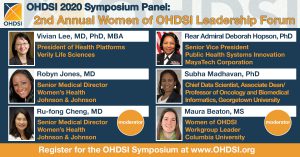 Panelists: Vivian Lee (President of Health Platforms, Verily Life Sciences), Robyn Jones (Senior Medical Director, Women’s Health, Johnson & Johnson), Rear Admiral Deborah Hopson (Senior Vice President, Public Health Systems Innovation, MayaTech Corporation), Subha Madhavan (Chief Data Scientist, Associate Dean/Associate Professor of Oncology and Biomedical Informatics, Georgetown University)
Panelists: Vivian Lee (President of Health Platforms, Verily Life Sciences), Robyn Jones (Senior Medical Director, Women’s Health, Johnson & Johnson), Rear Admiral Deborah Hopson (Senior Vice President, Public Health Systems Innovation, MayaTech Corporation), Subha Madhavan (Chief Data Scientist, Associate Dean/Associate Professor of Oncology and Biomedical Informatics, Georgetown University)
Moderators: Ru-fong Cheng (Senior Medical Director, Women’s Health, Johnson & Johnson) and Maura Beaton (Women of OHDSI Workgroup Leader, Columbia University)
Video: Full Presentation
The Women of OHDSI Leadership Forum was one of the highlights of our 2019 Symposium, so we were thrilled to bring it back for our Global Symposium. Once again, some leading women in healthcare joined our leadership forum to discuss their careers, the field and provide mentorship to the many women (and men) in our community who are at varying stages on their own journey.
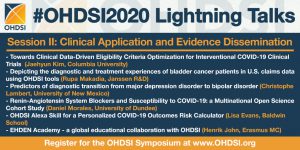
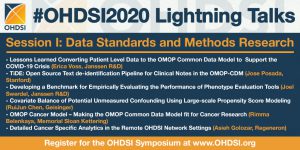 Collaborator Showcase
Collaborator Showcase
There were more than 100 presentations of OHDSI research and collaboration at this year’s Collaborator Showcase. Please go through the posters and software demos on this page to learn more about all this exciting work. We also had 12 lightning talks as part of the collaborator showcase, and they are listed below.
Collaborator Showcase Posters, Demos, Video Presentations and more
Lightning Talks: Data Standards and Methods Research
– Lessons Learned Converting Patient-Level Data to the OMOP Common Data Model to Support the COVID-19 Crisis (Erica Voss, Janssen R&D)
– TiDE: Open Source Text de-identification Pipeline for Clinical Notes in the OMOP-CDM (Jose Posada, Stanford)
– Developing a Benchmark for Empirically Evaluating the Performance of Phenotype Evaluation Tools (Joel Swerdel, Janssen R&D)
– Covariate Balance of Potential Unmeasured Confounding Using Large-scale Propensity Score Modeling (RuiJun Chen, Geisinger)
– OMOP Cancer Model – Making the OMOP Common Data Model fit for Cancer Research (Rimma Belenkaya, Memorial Sloan Kettering)
– Detailed Cancer-Specific Analytics in the Remote OHDSI Network Settings (Asieh Golozar, Regeneron)
Lightning Talks: Clinical Application and Evidence Dissemination
– EHDEN Academy – a global educational collaboration with OHDSI (Henrik John, Erasmus MC)
– Towards Clinical Data-Driven Eligibility Criteria Optimization for Interventional COVID-19 Clinical Trials (Jaehyun Kim, Columbia University)
– Depicting the diagnostic and treatment experiences of bladder cancer patients in U.S. claims data using OHDSI tools (Rupa Makadia, Janssen R&D)
– Predictors of diagnostic transition from major depression disorder to bipolar disorder (Christophe Lambert, University of New Mexico)
– Renin-Angiotensin System Blockers and Susceptibility to COVID-19: a Multinational Open Science Cohort Study (Daniel Morales, University of Dundee)
– OHDSI Alexa Skill for a Personalized COVID-19 Outcomes Risk Calculator (Lisa Evans, Baldwin School)
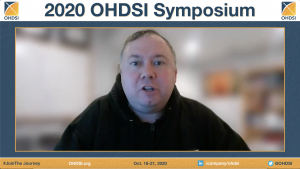 Closing Talk
Closing Talk
Presenter: Patrick Ryan
Patrick Ryan closes out the 2020 OHDSI Global Symposium with thoughts about the OHDSI Journey in 2020 through the COVID-19 pandemic, introduces the Titan Awards presentation, and discusses some of the community’s proudest moments. Cheers!
Video: Full Presentation
 Family Feud
Family Feud
Past Titan Award winners teamed up to see who knew the OHDSI Community best. Join the fun in these two episodes of OHDSI Family Feud: Battle of the Titans!
Videos: Episode 1 (Nerd Immunity vs. Hydras) • Episode 2 (Peaked In ’19 vs. Gitfluencers)

